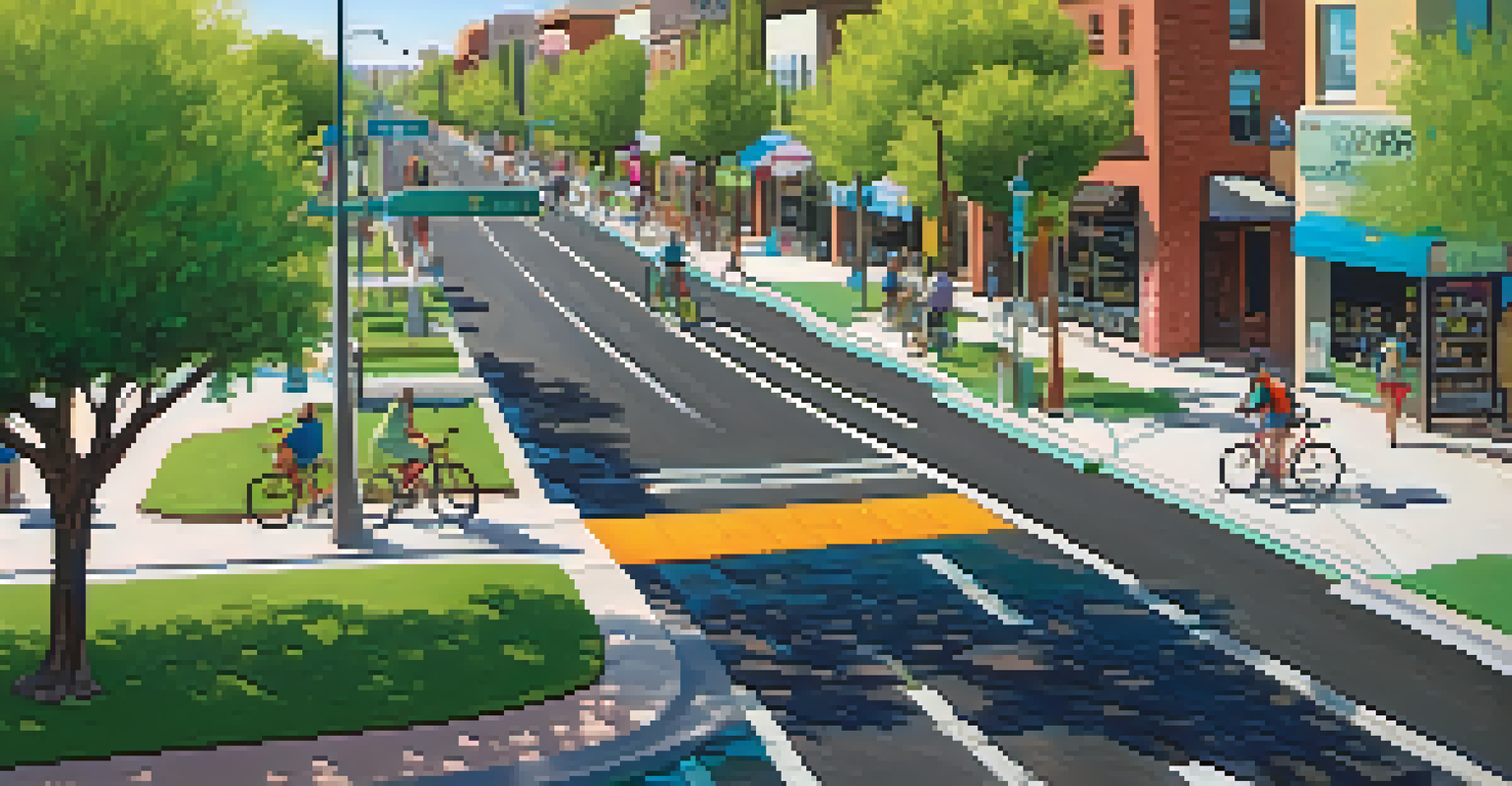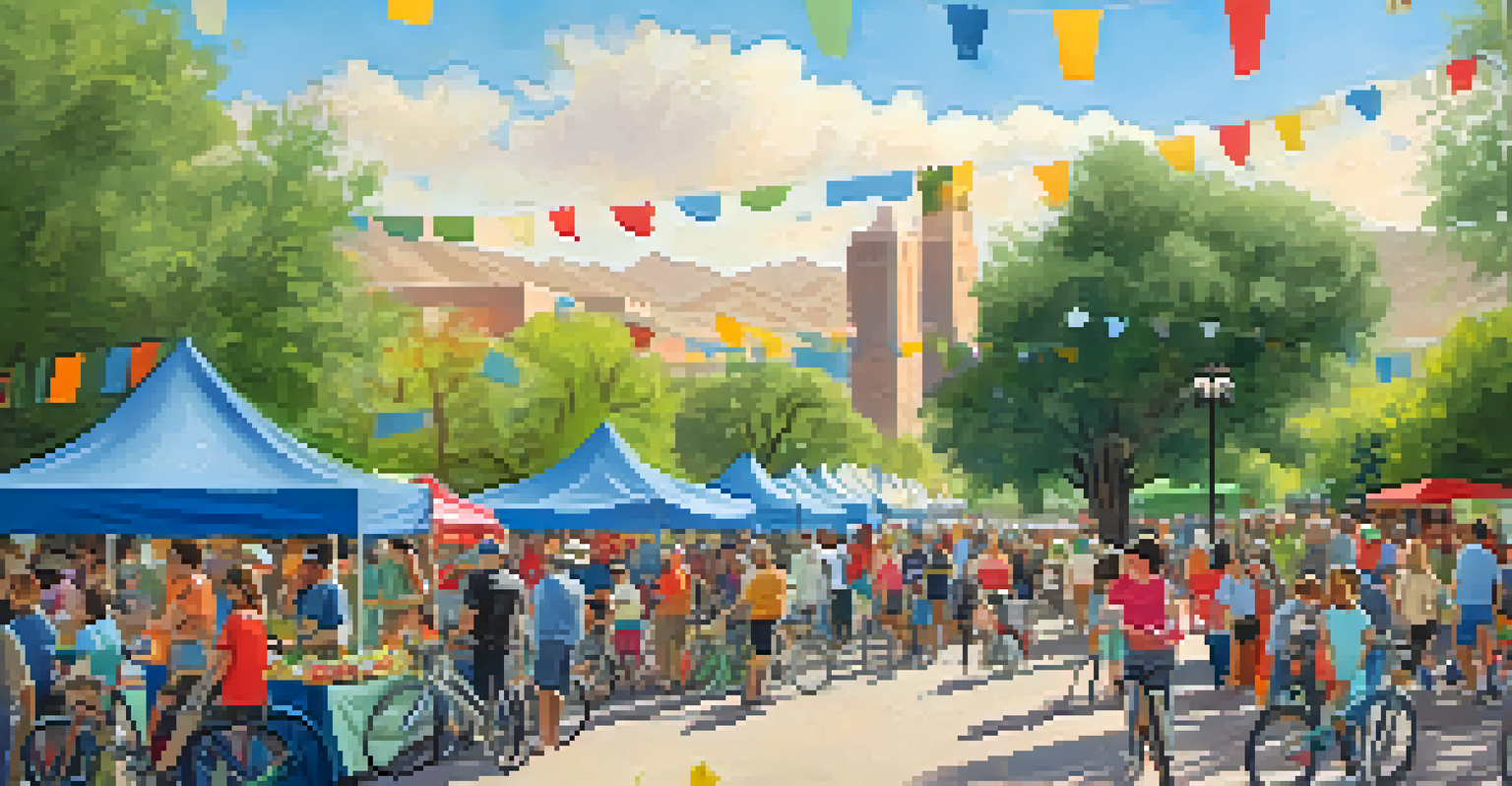Tucson's Role in Promoting Sustainable Transportation Options

The Importance of Sustainable Transportation in Tucson
Sustainable transportation is crucial for urban areas like Tucson, where air quality and traffic congestion are major concerns. By promoting eco-friendly options, Tucson can reduce greenhouse gas emissions and improve public health. It’s not just about getting from point A to point B; it’s about creating a livable environment for everyone.
Sustainable transportation is vital for urban areas to combat pollution and enhance the quality of life for residents.
In Tucson, the push for sustainable transportation aligns with broader goals of environmental stewardship and community well-being. The city recognizes that sustainable options can enhance the quality of life for residents while also attracting visitors. By investing in these initiatives, Tucson sets a precedent for other cities to follow.
Moreover, sustainable transportation can help foster a sense of community. When people choose to walk, bike, or use public transit, they connect more deeply with their surroundings and neighbors. This sense of belonging can lead to more vibrant neighborhoods and a stronger community spirit.
Tucson's Investment in Public Transportation
Tucson has made significant investments in public transportation to promote sustainability. The Sun Link streetcar, for instance, has become a vital part of the city's transit system, connecting key areas and making it easier for residents to leave their cars at home. This not only reduces traffic congestion but also lowers emissions.

Additionally, Tucson's public bus system, Sun Tran, has expanded its routes and services to better serve the community. With affordable fares and convenient schedules, it encourages more people to opt for public transit instead of driving. The city is committed to continuing these improvements to make public transportation more accessible and efficient.
Tucson's Commitment to Public Transit
The city has significantly invested in public transportation, making it easier for residents to opt for eco-friendly travel options.
These investments are crucial for promoting a shift in mindset about transportation. By providing reliable alternatives to driving, Tucson is not just offering a service; it's changing how residents think about their travel choices. This cultural shift is essential for long-term sustainability.
Biking Initiatives Transforming Tucson’s Streets
Biking is becoming an increasingly popular mode of transportation in Tucson, thanks to various city initiatives aimed at making cycling safer and more appealing. The establishment of dedicated bike lanes and paths has made navigating the city on two wheels much more convenient. This encourages more residents to consider biking as a viable option for commuting.
The best way to predict the future is to create it.
The city also hosts events like Bike to Work Day, which promotes cycling and raises awareness about the benefits of biking. These events create a sense of community among cyclists and inspire others to join in. It’s a fun way to encourage a healthier lifestyle while reducing the number of cars on the road.
In addition to infrastructure, Tucson provides resources for cyclists, such as bike repair stations and educational programs. By supporting cyclists, the city demonstrates its commitment to promoting sustainable transportation options and fosters a culture of eco-friendly commuting.
Pedestrian-Friendly Initiatives in Tucson
Tucson is making strides in creating a more pedestrian-friendly environment. This is evident in the city's investment in sidewalks, crosswalks, and pedestrian-only zones. These enhancements not only improve safety for walkers but also encourage more people to choose walking as a primary mode of transport.
Events like the Tucson Meet Yourself festival show off the city’s walkability and bring communities together. With streets closed to traffic, pedestrians can explore local crafts, food, and culture without the worry of cars. Such events highlight the advantages of a walkable city and promote a sense of community pride.
Biking and Walking Initiatives Thrive
Tucson is enhancing its biking and pedestrian infrastructure, encouraging healthier commuting options and fostering community connections.
Encouraging walking helps reduce reliance on vehicles, leading to less traffic and improved air quality. Tucson is committed to making walking a more appealing option, which ultimately contributes to a healthier and more sustainable city.
Electric Vehicle Initiatives in Tucson
Tucson is also embracing the future of transportation with its initiatives focused on electric vehicles (EVs). The city has implemented measures to increase the availability of EV charging stations, making it easier for residents to switch to cleaner energy vehicles. This infrastructure development is crucial for reducing carbon emissions from traditional gas-powered cars.
In addition to charging stations, Tucson offers incentives for residents who purchase electric vehicles. These incentives can include rebates or tax credits, making it more financially feasible for individuals to invest in EVs. By promoting these options, the city is taking tangible steps toward a more sustainable future.
Tucson’s commitment to electric vehicles reflects a broader trend toward renewable energy and sustainability. As more residents adopt EVs, the city will continue to benefit from reduced emissions and improved air quality, paving the way for a greener urban environment.
Community Engagement in Sustainable Transportation
Community engagement plays a vital role in Tucson's sustainable transportation initiatives. The city actively seeks input from residents through public forums and surveys, ensuring that the voices of the community are heard. This collaborative approach fosters a sense of ownership and investment in local transportation projects.
By involving the community, Tucson can better tailor its transportation solutions to meet the unique needs of its residents. This engagement helps identify areas for improvement and generates support for new initiatives. When people feel their opinions matter, they are more likely to participate in and promote sustainable practices.
Embracing Electric Vehicles
The city promotes electric vehicles through increased charging stations and financial incentives, aiming to reduce carbon emissions.
Furthermore, local organizations and advocacy groups are instrumental in raising awareness about sustainable transportation. By partnering with these groups, Tucson can amplify its message and encourage more residents to consider greener alternatives for their daily commutes.
Future Goals for Sustainable Transportation in Tucson
Looking ahead, Tucson has ambitious goals for its sustainable transportation initiatives. The city aims to expand its public transit system further, introducing more routes and services to reach underserved areas. This focus on inclusivity ensures that everyone has access to eco-friendly transportation options.
Additionally, Tucson plans to enhance its bike and pedestrian infrastructure, making it even safer and more enjoyable for residents to walk or cycle. This includes improving lighting, increasing the number of bike lanes, and creating more pedestrian-friendly spaces. Such developments will contribute to a more connected and vibrant city.

Ultimately, Tucson's commitment to sustainable transportation is about more than just reducing emissions; it's about creating a healthier, more connected community. By setting these goals, Tucson is paving the way for a brighter, greener future that benefits all its residents.